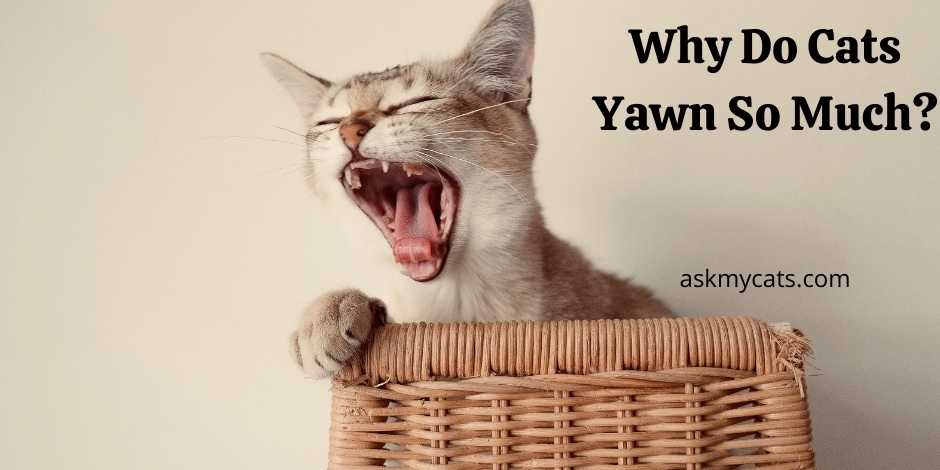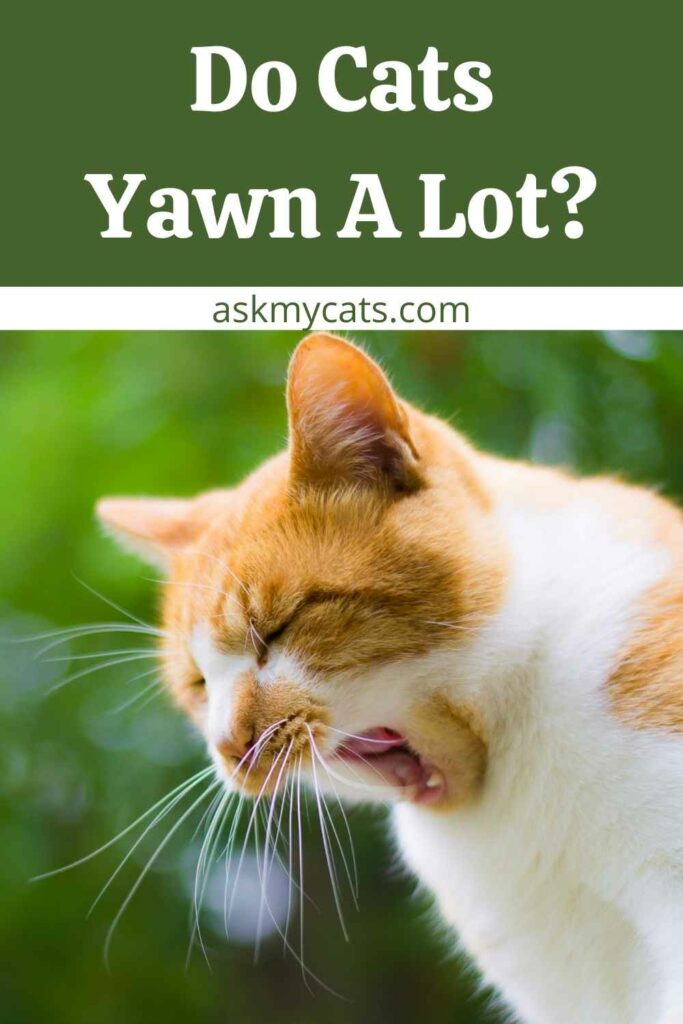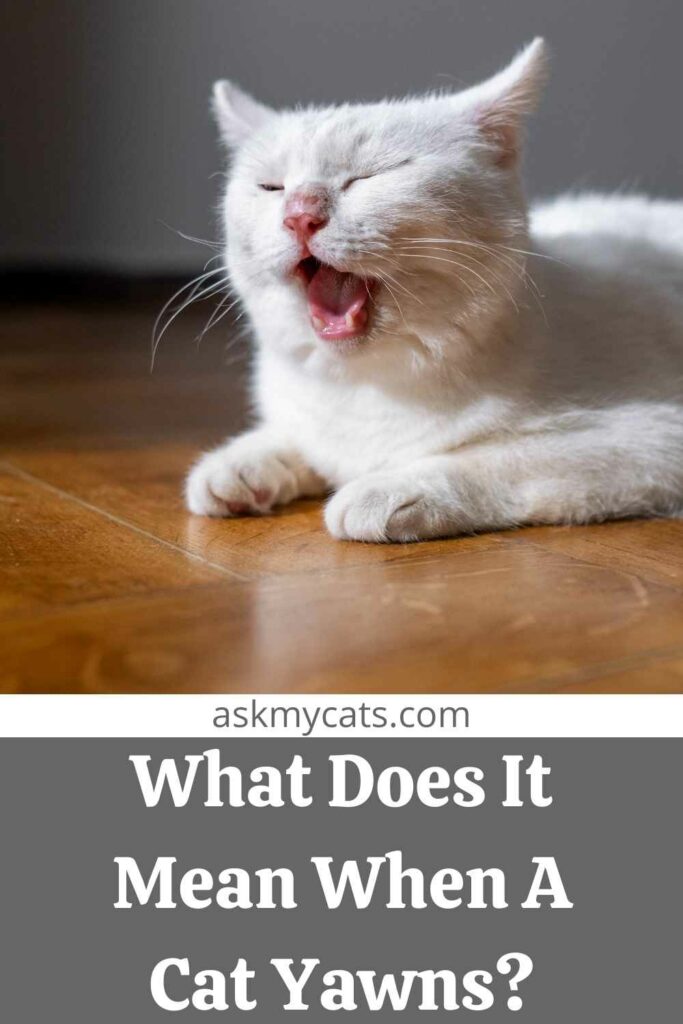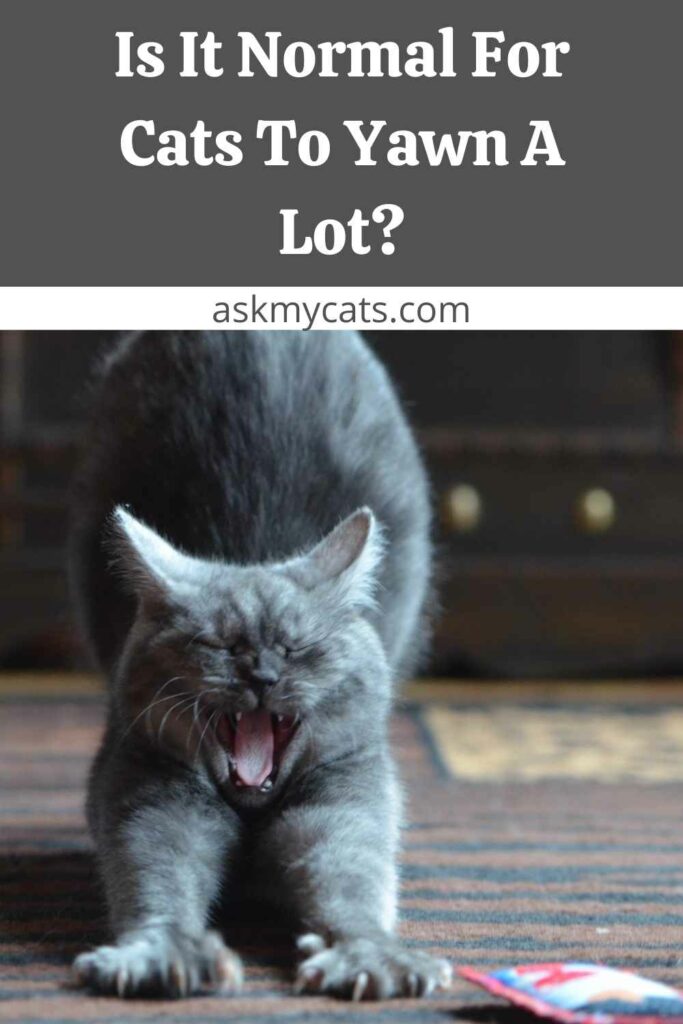Yawning is an involuntary reaction that involves a broad opening of the mouth and the widest possible expansion of the jaw, as well as a lengthy and deep inhale through the mouth and nose, followed by a leisurely expiration. Before and after sleeping, yawning is increased.
Felines spend a lot of their time sleeping, up to 15 hours a day; therefore it’s typical to see them yawning so much. Yawning is connected with a sense of well-being; weariness and your cat might just be calm or drowsy.
Although there is currently little knowledge on the actual physiological causes of this reaction, we are going to discuss various ideas and research which imply that cats yawn a lot.


Give Your Cat the Perfect Day
Get the Free Ebook!
Do Cats Yawn A Lot?
Yes, cats can yawn a lot.

Excessive yawning in cats can indicate a variety of oral problems, such as feline stomatitis. The oral area, from the lips to the throat, is inflamed with this illness. When cats are in discomfort in their mouths, they often try to relieve it by yawning a lot.
Moving the mouth can be annoying and difficult when you have these kinds of oral problems. When a cat with a mouth condition tries to open out wide and yawn, she may scream out and leap into the air!
If your cat yawns a bit too much for your liking, keep an eye out for other tell-tale signs of her mouth’s health. Apart from yawning excessively, cats with oral issues frequently pound their teeth together, drool excessively, and have foul breath.
It may also be difficult for them to swallow their food at mealtime. Take note if your cat appears to have an odd reaction to food; it’s time to schedule an appointment with the veterinarian.
Yawning is generally associated with relaxation and calm in cats. If your cat is completely at peace in her environment, she may show it by stretching out her entire body and yawning long and luxuriously.
Cats who do this are content and don’t perceive any dangers in their environment — in other words, everything is beautiful and nothing is frightening.
If your cat yawns a lot, it could not be a sign of happiness but rather an indication of a health condition, so take her to the vet to be sure.
Cats adore their owners, and the affection is reciprocated. When she sees you, she yawns, which is one way cats demonstrate their love and devotion. Your cat is at ease with you and enjoys your company.
Your cat stands up and welcomes you with a huge, long yawn when you arrive home from a hard day. It’s almost as though she’s trying to wake up so she can enjoy your time together with vigour and vigour.
Although humans normally yawn automatically as a consequence of observing another person yawning first, this is not the case in the feline world. If one cat yawns excessively, it will not cause another cat to yawn excessively as well.
What Does It Mean When A Cat Yawns?
When a cat yawns, it means they are feeling relaxed and comfortable.

Many researches have been conducted on the reasons of yawns in humans, dogs, cats, and other animals. However, there are also conflicting ideas.
Some individuals believe that cats utilise yawning as a way to unwind.
According to one study, it serves a more practical purpose. It was proposed that yawning has a neurophysiological purpose of increasing intracranial circulation and cooling the brain.
However, another theory proposes that it has something to do with emotional arousal levels. When the surrounding environment delivers little or no stimulation, animals utilise yawning to maintain or enhance their alertness levels, according to this study.
So, it’s possible that cats yawn because they’re bored! Another popular notion considers yawning to be a stress indicator.
It’s a regular scene: your cat gets up in the morning, stretches out, arches their back, and yawns before racing over to their food bowl.
Many owners notice that their cat yawns more frequently in the morning than in the evening.
This implies that our cats aren’t yawning just because they’re sleepy. If this were the case, we’d notice them yawning before going to bed!
It’s doubtful that your cat is yawning first thing in the morning because they’re agitated.
Perhaps it’s for neurophysiological reasons, as several studies show. Perhaps your cat simply loves stretching and yawning when they first wake up.
Is It Normal For Cats To Yawn A Lot?
Yawning in cats is usually nothing to be concerned about. It’s a fully innocuous activity in general.

However, if your cat appears to be experiencing difficulties with its jaw, such as straining to fully shut it after yawning, you should take them to the vet to find out what’s wrong.
And, as we’ve seen, cats may yawn as a displacing activity when they’re anxious.
So, if your cat starts yawning a lot more than usual, it’s probable that something in your home is stressing them out.
Examine your cat to see if there are any obvious sources of stress, or if there are any other indicators of stress.
Make your cat’s environment as pleasant and safe as possible to attempt to prevent yawning due to stress.
The answer to this question is that yawning is a normal and frequent activity in cats; but, if you find that the frequency of yawning has increased, this might indicate that something else is going on.
If you’ve observed that your cat yawns more than usual recently, you should take it to the vet to rule out the potential of a medical condition causing the excessive yawning.
Pain in any of the structures of the oral cavity may cause cats to increase their yawing activity in an attempt to alleviate the discomfort. Cats with periodontitis or feline oral stomatitis have been found to yawn more frequently.
When your cat’s mouth is wide open during a yawn, carefully check it; if you notice any clear symptoms of redness or irritation, take your cat to the veterinarian as soon as possible.
How Many Times Does A Cat Yawn?
A cat yawns on the average of 109,500 times in his life.
Yawning is a reflex that cats employ to eliminate excess carbon dioxide. Too much Carbon dioxide causes your body to need additional oxygen, which may be readily rectified by yawning deeply. Some scientists believe that felines yawn as a form of communication.
Do Cats Yawn When Stressed?
Yes, cats will yawn when they feel stressed.
Stress and anxiety are common in cats, although they can be difficult to identify. In cats, excessive yawning and shedding might be indicators of stress. Cats that have accidents outside of their litter box or lose their appetite might be stressed by their surroundings or other animals.
It’s totally likely that our cats yawn when they’re stressed out. In fact, yawning has been identified as a stress indicator in cats in multiple researches.
It’s also conceivable that cats yawn as a form of displacement. When a cat is torn between two opposing motivations, it engages in displacement behaviour.
Perhaps your cat wants to do something but is hesitant about doing it because it is threatened by something else.
Your cat may yawn as displacement behaviour if this happens. Displacement actions, according to studies, are a means to disperse energy from competing goals.
Another prevalent displacement habit in cats is grooming.
Do Cats Yawn When They’re Tired?
When cats are tired, they yawn, but they haven’t yet recognised that they’re ready to sleep. This is essential because felines are adept at saving energy.
The cat didn’t simply go to sleep and ignore you, as its instincts may have suggested. When you entered the room, it remained awake and yawned.
Cats have good hearing and can detect noises with an SPL of 70 dB from 48 Hz to 85 kHz. According to Hearing Research, they have among of the most extensive hearing ranges of any animal.
When you’re going to enter into a room, your cat will be able to detect you. As a result, it may have lifted its head, glanced at you, and yawned to indicate that it is getting ready to sleep.
It doesn’t want to be bothered, and it certainly doesn’t want to be startled awake. This might be another indicator of a cat pushing its will on you, depending on your point of view. It might also be a politeness since if you wake the cat up later; it won’t walk away from you or appear cranky.
If the cat didn’t find you interesting, it wouldn’t have bothered waking up long enough to yawn at you.
Do Cats Fake Yawn?
Some cats fake yawn to get people’s attention.
This is especially true if they yawn and then meow, hiss, growl, or make any other noise. The cat was extending its mouth or making a move to capture your eye, rather than showing rest or slumber. Some pet owners believe that cats yawn as a form of communication.
In humans, contagious yawning has been related to empathy, and it is a sort of emotional contagion that can be investigated in animals. According to this research, cats do not yawn in reaction to human yawning.
Frequently Asked Questions
Why do cats yawn so big?
When a cat’s body signals that it needs more oxygen, he or she may yawn. Excess carbon dioxide is expelled from the lungs with a big yawn, allowing place for more fresh air and oxygen.
Why does my cat keep yawning and licking lips?
A happy and pleased cat blinks or yawns, but a frightened or angry cat licks its lips when it isn’t meal time. You may also ‘speak’ to your cat in a way that he understands.
Why do cats yawn when you yawn?
If your cat yawns when it sees you, it might be an attempt to communicate; cats yawning to other cats convey a comfortable and relaxed disposition. Other factors that cause a cat to yawn include: Staying awake — some feel that yawning helps cats “restart” a drowsy brain.
Final Words
Yawning is a common activity in cats; they may do so when they are calm or drowsy, to gradually grow more alert, or to thermoregulate.
When the weather becomes warmer, it’s natural to observe a minor rise in yawning. If your cat, on the other hand, seems to be yawning constantly, it might be a sign of a medical problem.
Leave your questions in the comments section below.
